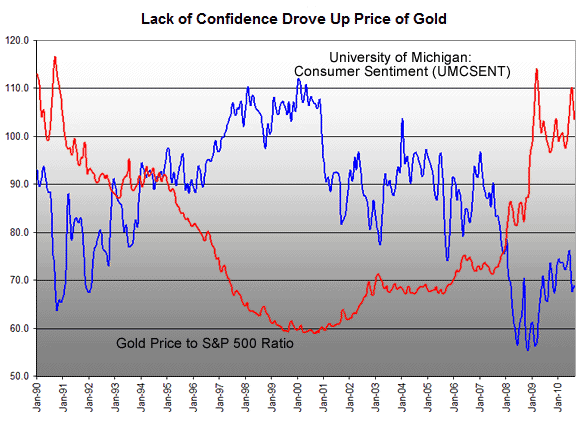Experienced investors know that no trend -- no matter how profitable -- lasts forever.
The same is true for gold. Gold prices have risen sharply in recent years. And while any mention of shorting gold gets its fanatics' blood boiling, one day the time will come when it's the right trade to make.
Consumer Sentiment
My daughter is home for a couple of months before she starts work as an attorney. When I asked her if it was time to go short on gold, and she said that she hoped so. Her thought was, if I'm shorting gold, then I believe the economy is improving, jobs are forming and a brighter future is heading our way. And that would be terrific news for many of her friends who recently finished graduate school and are still looking for jobs.
Her comments very much reflect the effect that confidence has on the economy. If things are looking up, people are willing to invest in risky assets that offer the chance for higher returns. Returns generated from a growing economy create optimism that the future will be brighter than it is now.
On the other hand, if people do not have confidence in the economy, they are more likely to consider owning gold to protect their capital. Until they have more confidence in the economy, many investors will continue to hold more gold than they've typically held in the past.
Gold prices tend to move opposite of consumer sentiment, measured here by the University of Michigan's Consumer Sentiment Index (UMCSENT). When consumer sentiment trends down, the price of gold trends up. The reverse holds true as well. This pattern has held since gold was removed as the peg for the United States' currency, making it a good indicator of the overall trend for gold.
While it is tempting to look at a chart of the price of gold compared to consumer sentiment, this would be misleading. Investors do not just own gold and then not own it. Once they liquidate gold holdings, they move their capital to a different asset class depending on the risk/return profile. If consumer sentiment is increasing, investors are more comfortable moving their capital to higher risk assets like equities. When consumer sentiment is falling, investors will move their capital from equities into hard assets like gold. Instead, we'll look at the ratio of gold prices to the price of the S&P 500.
The chart below compares consumer sentiment to the gold to S&P 500 ratio starting in 1990 and ending in early September 2010. If we look at the chart, consumer confidence hit one of its lowest points during the recession of 1990. During the same period, the ratio of gold prices to the S&P 500 was hitting a twenty-year high.

According to the chart, low points in consumer sentiment are a good place for gold investors to take some profits. And for the more aggressive investor, it may indicate a good time to start shorting gold.
Knowing what we do about the relationship between confidence and gold prices, when fear of a major crisis drives confidence down, placing some of your capital in gold makes sense. As fear drives gold higher, you can ride along. But when confidence hits its lowest point and then starts turning up, it may be time to start reducing your gold holdings. Any improvement in the consumer sentiment numbers will encourage investors to sell their gold and move into assets such as equities.
Google 'Buy Gold' Searches
Let's look at another piece of supporting evidence for a downturn in gold. In John Persinos' article, How to Excel at Market Timing, he mentions that Google Timeline searches for 'buy gold' peaked in November 2009 just as the price of gold peaked. In other words, when the average retail investor has decided they should get on the gold bandwagon, it's usually a good sign that the price has hit a peak and you should take some profits.

Time to Short Gold?
Up to now, I have focused on how to time when to short gold, not whether now is that time. When an asset like gold has had a large run-up on the deterioration of expectations by consumers and investors, there is bound to be a retreat, especially when investors begin to move their capital to higher risk assets and away from gold.So I'm going to lay it out there for all the gold-bugs to see. With consumer sentiment having already reached its low, now is a good time to reduce your gold holding. If you're a more aggressive investor, or have some money set aside for speculative investments, you may want to consider shorting gold or gold funds. As consumer sentiment rises and confidence slowly returns to the economy, investors holding gold will soon start selling some or all of their holdings, which will drive down the price. While it may not be part of the mainstream sentiment about gold, as a contrarian investor, that's the sort of bet to look for.



